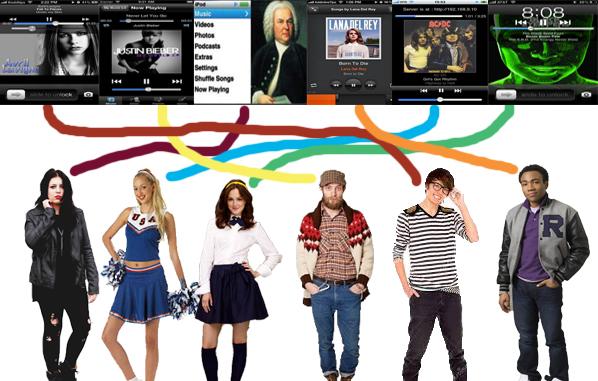Stop, collaborate and listen
Why you should think twice before judging someone on their music tastes

Although many may be quick to judge another for their music tastes, the songs we listen to and enjoy may not be related all that closely to our personalities.
iPhones, iPods and even the rarely-seen MP3 players have one thing in common: they all play music. The kind of music that travels through those speakers is up to the listener, but it may not be what an observer might assume.
“I listen to all music except country. I just think those songs just all sound the same to me. It’s probably also something to do with my mom listening to it all the time,” Sophomore David Mckenna said.
If you’re in class and see a girl wearing an outfit that could be considered stereotypical “goth” clothing, you might wonder if she is listening to stereotypical “goth” music as well. Do you, and more importantly, should you make that assumption? In reality, she might be listening to Taylor Swift or another “Top 40” radio artist. See the problem? Humans naturally prejudge, and there is little else they prejudge harsher than appearances, and consequently “abstract” music tastes. This is music-shaming.
“Everyone bashes me about country music,” Sophomore Jacklyn Hartle said.
Specifically country music seems to be a strong topic of debate for many students, but why is that? Could it be that they too don’t want to be mislabeled?
“I feel like the city slickers don’t want to be labeled as country bumpkins,” Sophomore Paige Velemirovich said.
This is not just detrimental to human confidence (i.e. hiding all the shameful tunes of Hannah Montana and High School Musical on a hidden iPod), but also to the bands and artists who painstakingly ocmposed this certian music.. Labeling bands as “hipster” or “mainstream” can severely limit artistic expression and rigidly compartmentalize music as an art form. It allows us as a whole society to decide who is “cool” and who is not in terms of music, and therefore make wild assumptions on who a person is. It may seem like a stretch, but how many times do you prejudge, especially if you are honest about it?
“I am a guilty music shamer. I’m assuming right now that you listen to Taylor Swift.” McKenna said. Of course, maybe he just saw the Taylor Swift shirt.
Furthermore, the same should be considered with gender stereotypes. Just because a boy likes Britney Spears doesn’t mean his personality is feminine and un-masculine. Just because a girl likes Wiz Khalifa, doesn’t mean she is masculine, and therefore un-feminine. Not only that, but personalities do not equate with music either, such as people who listen to classical music are not always “proper” or people who listen to alternative or metal are not always “rebellious.” Music itself has no set gender or personality, and music tastes can range across the entire music genre spectrum. So why limit ourselves to what someone else deemed appropriate or popular? If we love music so passionately, why should we hold back? Many people may have one answer to this: we shouldn’t.
What many may wonder after this realization is: how do we truly get past this fear of musical rejection? How do we listen to our favorite songs without being ridiculed for it being “lame” by modern society, our family, our friends and perfect strangers? The answer begins and ends with us, the people who listen to it.
There are very few individuals who are not guilty of shaming other people for having opposite music tastes at one time or another. If you like Paramore, and another person likes Jason Aldean, do you make fun of them, dislike them or label them as a “hick”? Do they do the same to you, make fun of you, dislike you or label you as a “punk”? If you wouldn’t want someone to shame you, then don’t shame them. It’s a simple solution, and it’s not a perfect one, but it’s a definite step in the right direction. Diversity is what makes life exciting, and it is the same with music. Just because a song isn’t your favorite, doesn’t mean you have to tear it apart and ruin the experience for someone else.
In the future when you’re listening to your tunes, ask yourself if you listen to songs because you like them, or because everyone else likes them, and you’re just trying to “fit in.” Any passionate music lover will tell you: you love what you love and there is no explanation or justification for it. If someone else doesn’t understand, it’s their problem, not yours. Most importantly, be unapologetic. Love rap, country, pop, classical, rock, indie, alternative, jazz, metal, reggae music and everything in between. Then, let the music speak for itself.


